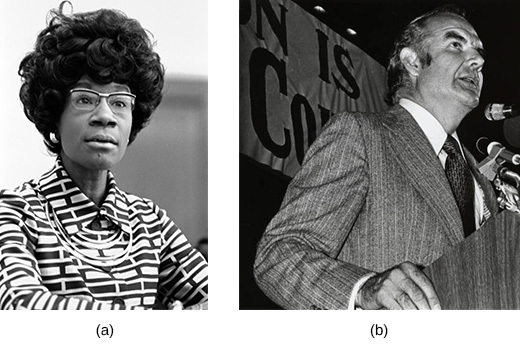| << Chapter < Page | Chapter >> Page > |
Feeling the pressure of domestic antiwar sentiment and desiring a decisive victory, Nixon went into the 1972 reelection season having attempted to fashion a “new majority” of moderate southerners and northern, working-class whites. The Democrats, responding to the chaos and failings of the Chicago convention, had instituted new rules on how delegates were chosen, which they hoped would broaden participation and the appeal of the party. Nixon proved unbeatable, however. Even evidence that his administration had broken the law failed to keep him from winning the White House.
Following the 1968 nominating convention in Chicago, the process of selecting delegates for the Democratic National Convention was redesigned. The new rules, set by a commission led by George McGovern, awarded delegates based on candidates’ performance in state primaries ( [link] ). As a result, a candidate who won no primaries could not receive the party’s nomination, as Hubert Humphrey had done in Chicago. This system gave a greater voice to people who voted in the primaries and reduced the influence of party leaders and power brokers.

It also led to a more inclusive political environment in which Shirley Chisholm received 156 votes for the Democratic nomination on the first ballot ( [link] ). Eventually, the nomination went to George McGovern, a strong opponent of the Vietnam War. Many Democrats refused to support his campaign, however. Working- and middle-class voters turned against him too after allegations that he supported women’s right to an abortion and the decriminalization of drug use. McGovern’s initial support of vice presidential candidate Thomas Eagleton in the face of revelations that Eagleton had undergone electroshock treatment for depression, followed by his withdrawal of that support and acceptance of Eagleton’s resignation, also made McGovern look indecisive and unorganized.
Nixon and the Republicans led from the start. To increase their advantage, they attempted to paint McGovern as a radical leftist who favored amnesty for draft dodgers. In the Electoral College, McGovern carried only Massachusetts and Washington, DC. Nixon won a decisive victory of 520 electoral votes to McGovern’s 17. One Democrat described his role in McGovern’s campaign as “recreation director on the Titanic.”
Nixon’s victory over a Democratic party in disarray was the most remarkable landslide since Franklin D. Roosevelt’s reelection in 1936. But Nixon’s victory was short-lived, however, for it was soon discovered that he and members of his administration had routinely engaged in unethical and illegal behavior during his first term. Following the publication of the Pentagon Papers, for instance, the “ plumbers ,” a group of men used by the White House to spy on the president’s opponents and stop leaks to the press, broke into the office of Daniel Ellsberg’s psychiatrist to steal Ellsberg’s file and learn information that might damage his reputation.

Notification Switch
Would you like to follow the 'U.s. history' conversation and receive update notifications?